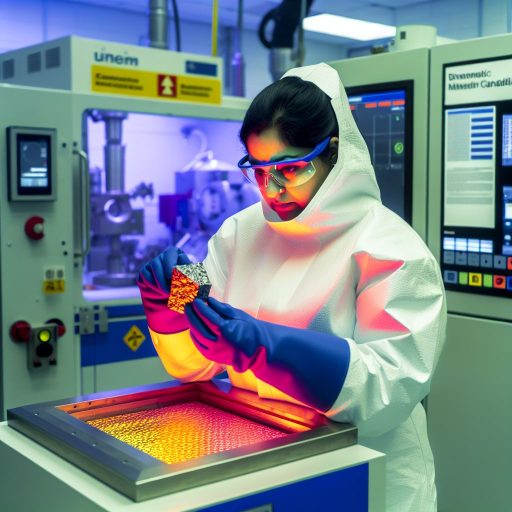Overview of Metallurgical Engineering and Its Scope
Metallurgical engineering plays a crucial role in modern technology.
This field focuses on the study of metals and their properties.
It combines principles from chemistry, physics, and engineering.
Metallurgical engineers develop new materials and processes.
Additionally, they improve existing metal products for durability.
Key Areas of Metallurgical Engineering
There are several primary areas in metallurgical engineering.
These include materials processing, extraction, and design.
Each area impacts various industries significantly.
Materials Processing
Materials processing involves shaping and treating metals.
Engineers utilize techniques like casting, forging, and welding.
These methods enhance mechanical properties and surface finish.
Extraction Metallurgy
Extraction metallurgy focuses on obtaining metals from ores.
This area includes hydrometallurgy and pyrometallurgy techniques.
Engineers work to optimize extraction efficiency and sustainability.
Metallurgical Design
Metallurgical design emphasizes creating new alloys and composites.
Engineers analyze mechanical and thermal properties for applications.
This ensures that materials meet specific performance requirements.
Importance in Industries
Metallurgical engineers contribute significantly to various industries.
They play a vital role in construction, automotive, and aerospace sectors.
In construction, they ensure the durability of steel structures.
Automotive engineers rely on their expertise for safety and performance.
Aerospace applications depend on lightweight and strong materials.
Contribution to Sustainable Practices
Metallurgical engineers also focus on sustainability.
They develop recycling processes for metal waste.
Furthermore, they seek to reduce the environmental impact of mining.
Unlock Your Career Potential
Visualize a clear path to success with our tailored Career Consulting service. Personalized insights in just 1-3 days.
Get StartedThis contributes to a more sustainable resources strategy.
Historical Development of Metallurgical Engineering
Early Beginnings
Metallurgy has roots that trace back thousands of years.
Ancient civilizations pioneered the extraction and use of metals.
They transformed raw materials into tools and ornamentation.
For instance, the use of copper dates back to 9000 B.C.
Later, the discovery of bronze marked a significant advancement.
These developments facilitated improved weaponry and machinery.
Evolution through the Ages
The Middle Ages ushered in new metallurgical methods.
Alchemists sought to transform simple metals into gold.
This quest led to discoveries in chemical processes.
Innovations in iron production occurred during the Industrial Revolution.
New techniques increased production efficiency and quality.
Consequently, industries expanded rapidly, relying on metal components.
Modern Metallurgical Engineering
The 20th century saw the rise of advanced metallurgical science.
Researchers began studying metal alloys and their properties.
This knowledge led to the development of specialized materials.
For example, stainless steel revolutionized the food and medical industries.
Furthermore, advancements in aerospace technology required new materials.
Metallurgical engineering became crucial in achieving these innovations.
Current Trends and Future Directions
Today, metallurgical engineers address sustainability issues.
They focus on recycling metals to reduce waste and energy use.
Moreover, they develop lightweight, high-performance materials.
These materials are vital for electric vehicles and renewable energy systems.
Looking ahead, the profession will likely evolve with technology.
Artificial intelligence and machine learning will enhance material research.
Role of Metallurgical Engineers in Material Selection and Processing
Importance of Material Selection
Metallurgical engineers play a crucial role in selecting the right materials for various applications.
They assess the performance requirements, costs, and environmental impacts of materials.
Furthermore, their expertise helps ensure the right balance between strength and weight.
This selection process directly influences the efficiency and safety of products.
Material Processing Techniques
Metallurgical engineers are responsible for developing and optimizing material processing techniques.
They employ methods such as casting, forging, and welding to manipulate materials.
In addition, they analyze how different processes affect material properties.
By understanding these techniques, they can improve manufacturing efficiencies.
Collaboration with Other Engineers
Metallurgical engineers often collaborate with other engineering disciplines.
For example, they work closely with mechanical engineers in designing components.
This collaboration enhances the overall product performance and durability.
Moreover, successful teamwork leads to innovative solutions and advancements in technology.
Research and Development Contributions
Research and development is another key area where metallurgical engineers excel.
They investigate new materials and technologies to stay ahead of industry trends.
Additionally, their work can lead to more sustainable practices and green technologies.
Through R&D, they continually seek to improve material properties and reduce costs.
Industry Applications
Metallurgical engineers apply their skills across various industries.
They work in aerospace, automotive, electronics, and construction sectors.
Each of these fields relies on high-performance materials to ensure safety and reliability.
Consequently, their expertise is pivotal in meeting industry standards and regulations.
Explore Further: How to Land an Internship in Aerospace Engineering
Significance of Metallurgical Engineers in Sustainable Development
Role in Resource Conservation
Metallurgical engineers play a crucial role in conserving resources.
They enhance the recycling of metals, reducing the need for virgin materials.
This practice saves energy and minimizes environmental impact.
Development of Sustainable Materials
These engineers specialize in developing sustainable materials for industries.
They create lighter and stronger alloys that improve energy efficiency.
Advanced materials help in reducing carbon footprints across sectors.
Innovation in Processes
Metallurgical engineers innovate processes for metal extraction and processing.
They implement methods that minimize waste and emissions.
Such innovations lead to cleaner production techniques.
Collaboration with Other Disciplines
Collaboration with environmental scientists is essential for metallurgical engineers.
This teamwork enhances the understanding of materials’ environmental effects.
It fosters the development of eco-friendly technologies.
Education and Awareness
Metallurgical engineers contribute to public education on material sustainability.
They actively engage in research and outreach programs.
Through these efforts, they raise awareness of responsible material use.
Learn More: Career Pathways in Biomedical Engineering
Impact of Metallurgical Engineering on the Automotive Industry
Material Selection
Metallurgical engineers play a critical role in material selection for vehicles.
They analyze the properties of metals to ensure optimal performance.
This selection impacts durability, safety, and weight of vehicles.
For example, lightweight alloys improve fuel efficiency.
Additionally, high-strength materials enhance crashworthiness.
Manufacturing Processes
Metallurgical engineers also influence manufacturing processes.
They develop techniques such as forging, casting, and welding.
Each process affects the final product’s quality and cost.
For instance, advancements in welding improve structural integrity.
Moreover, innovative casting techniques reduce production waste.
Innovations in Automotive Components
There are significant innovations in automotive components due to metallurgy.
Engineers are developing advanced materials for engine parts.
These materials provide better heat resistance and fatigue strength.
Additionally, they create brake systems with improved performance.
This enhances overall vehicle safety and reliability.
Recycling and Sustainability
Sustainability is a top priority in modern metallurgical engineering.
Engineers focus on recycling metals used in vehicles.
This process minimizes environmental impact and resource depletion.
Recycled metals often meet the same quality standards as new materials.
Furthermore, this practice supports a circular economy in the automotive sector.
Collaboration with Other Engineers
Collaboration among different engineering disciplines is vital.
Metallurgical engineers work closely with mechanical and electrical engineers.
This teamwork drives innovation and enhances vehicle performance.
They share insights that lead to new designs and technologies.
Ultimately, this collaboration benefits the entire automotive industry.
Gain More Insights: Key Certifications for Chemical Engineers in Canada

Application of Metallurgical Engineering in Aerospace and Defense
Material Selection and Development
Metallurgical engineers play a crucial role in material selection for aerospace components.
They conduct research to identify materials that withstand extreme conditions.
These materials must be lightweight yet strong to ensure aircraft efficiency.
Engineers consider factors like corrosion resistance and thermal properties.
Innovative alloys and composites are often developed to meet these demands.
Failure Analysis and Prevention
Failure analysis is another vital aspect of metallurgical engineering in aerospace and defense.
Engineers investigate material failures to determine their causes.
They utilize advanced techniques to analyze stress fractures and fatigue issues.
This process helps to improve design and manufacturing processes.
Ultimately, it enhances the safety and reliability of aerospace systems.
Manufacturing Processes
Metallurgical engineers optimize manufacturing processes in aerospace production.
They focus on methods like casting, forging, and additive manufacturing.
Engineers evaluate how these processes affect material properties.
By tailoring processes, they ensure the final product meets stringent specifications.
This expertise leads to innovative solutions that provide a competitive edge.
Research and Development
Continuous research and development are essential in aerospace and defense.
Engineers explore advanced materials and manufacturing techniques.
This exploration enhances performance and durability in the field.
Partnerships with universities and research institutions further this innovation.
As a result, the industry keeps pace with technological advancements.
Collaboration with Multidisciplinary Teams
Metallurgical engineers collaborate closely with various engineering teams.
They work with mechanical, aeronautical, and electrical engineers.
This collaboration leads to comprehensive design solutions.
Additionally, they contribute input on materials to optimize overall performance.
Such teamwork ensures optimal functionality of aerospace systems.
See Related Content: Top Universities in Canada for Chemical Engineering
Contribution of Metallurgical Engineers to Electronics and Technology
Role in Material Selection
Metallurgical engineers play a crucial role in selecting materials for electronic devices.
They analyze the properties of metals and alloys to ensure optimal performance.
Furthermore, they consider factors such as conductivity and durability.
This selection process directly affects the efficiency of electronic components.
Advancements in Semiconductor Technology
Metallurgical engineers contribute significantly to semiconductor technology.
They focus on refining materials like silicon and germanium.
These materials are essential for manufacturing transistors and diodes.
By improving material properties, they enhance device functionality.
Innovations in Manufacturing Processes
In the realm of electronics, process innovation remains vital.
Metallurgical engineers devise new techniques to improve manufacturing efficiency.
For instance, they develop methods for more effective metal coating.
This innovation minimizes waste and reduces production costs.
Ensuring Product Reliability
Reliability is a key concern in consumer electronics.
Metallurgical engineers conduct extensive testing and analysis of materials.
They assess how materials respond to thermal and mechanical stress.
This ensures that electronic products maintain functionality over time.
Contribution to Sustainable Technologies
Metallurgical engineers support sustainable practices in technology development.
They explore recyclable materials to reduce environmental impact.
Additionally, they focus on creating energy-efficient processes.
Such contributions lead to greener production methods in electronics.
Collaboration with Other Disciplines
Metallurgical engineers often collaborate with professionals from various fields.
They work closely with electrical engineers to optimize product designs.
This teamwork leads to innovative solutions in electronics.
Furthermore, interdisciplinary cooperation enhances research and development efforts.
Future Trends in Metallurgical Engineering and Emerging Technologies
Advancements in Materials Science
Metallurgical engineers are driving innovation in materials science.
They focus on developing lightweight and high-strength materials.
These materials enhance efficiency in various industries.
Additionally, nanotechnology is gaining traction in metallurgy.
This technology allows the manipulation of materials at the atomic level.
As a result, engineers can create materials with superior properties.
Sustainable Metallurgy Practices
There is a growing emphasis on sustainability in metallurgy.
Metallurgical engineers are adopting eco-friendly practices.
They aim to minimize waste and reduce energy consumption.
Recycling of metals has become a priority in the industry.
Engineers are finding innovative ways to reuse materials efficiently.
Digital Transformation in Metallurgy
Digital technologies are reshaping the metallurgical landscape.
Data analytics and machine learning are vital tools for engineers.
These technologies help optimize manufacturing processes.
Moreover, the use of simulations enhances design accuracy.
The concept of Industry 4.0 is also gaining momentum.
This approach integrates smart manufacturing with metallurgical processes.
Collaboration with Other Disciplines
Metallurgical engineering increasingly collaborates with other fields.
For instance, partnerships with nanotechnology experts are common.
Furthermore, collaborations with software engineers enhance product design.
This interdisciplinary approach fosters innovation and efficiency.
Consequently, engineers can create cutting-edge solutions.
Emerging Market Demands
Market demands continue to evolve in the metallurgical sector.
For example, the aerospace and automotive industries require advanced materials.
Metallurgical engineers are adapting to meet these needs.
They focus on improving performance and sustainability.
Additionally, the medical field is seeking biocompatible materials.
Engineers are responding with innovative solutions that comply with regulations.
Additional Resources
Is getting a Metallurgy Engineering Degree worth it ? : r/metallurgy
Electrification and Decarbonization Solutions for Industry Workshop …




